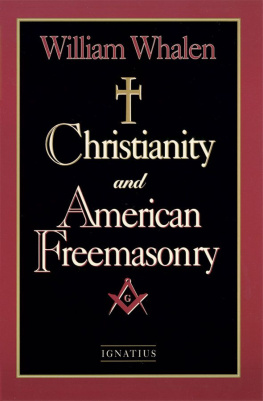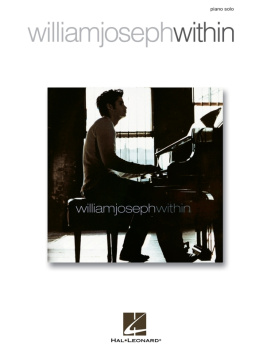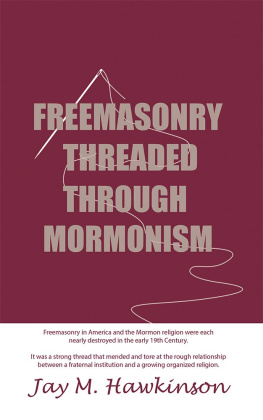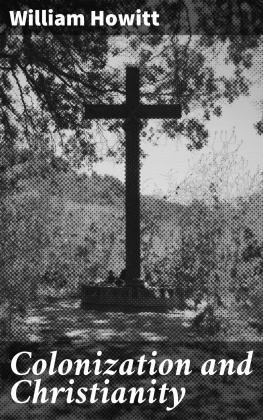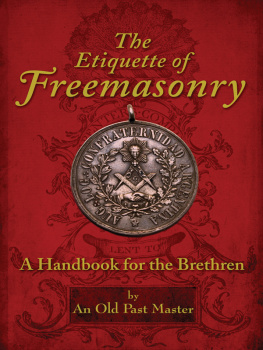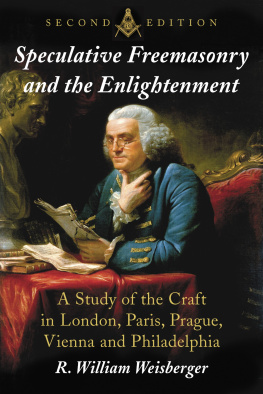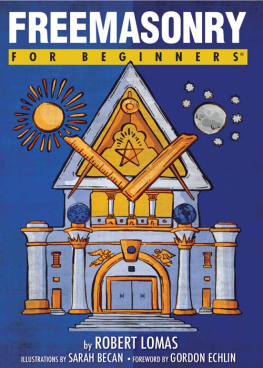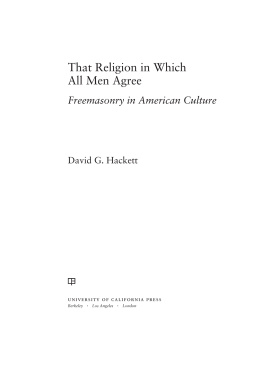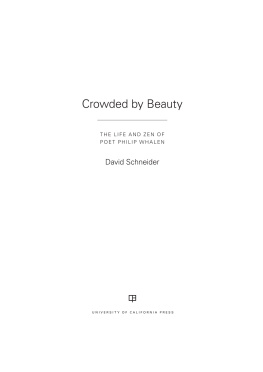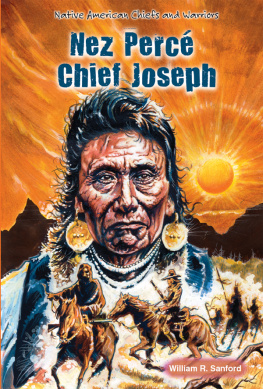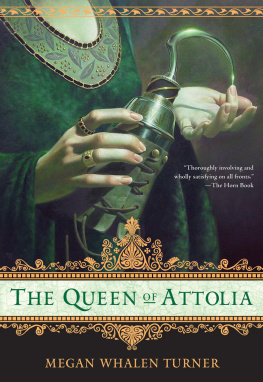William Joseph Whalen - Christianity and American Freemasonry
Here you can read online William Joseph Whalen - Christianity and American Freemasonry full text of the book (entire story) in english for free. Download pdf and epub, get meaning, cover and reviews about this ebook. year: 1998, publisher: Ignatius Press, genre: Religion. Description of the work, (preface) as well as reviews are available. Best literature library LitArk.com created for fans of good reading and offers a wide selection of genres:
Romance novel
Science fiction
Adventure
Detective
Science
History
Home and family
Prose
Art
Politics
Computer
Non-fiction
Religion
Business
Children
Humor
Choose a favorite category and find really read worthwhile books. Enjoy immersion in the world of imagination, feel the emotions of the characters or learn something new for yourself, make an fascinating discovery.
- Book:Christianity and American Freemasonry
- Author:
- Publisher:Ignatius Press
- Genre:
- Year:1998
- Rating:4 / 5
- Favourites:Add to favourites
- Your mark:
- 80
- 1
- 2
- 3
- 4
- 5
Christianity and American Freemasonry: summary, description and annotation
We offer to read an annotation, description, summary or preface (depends on what the author of the book "Christianity and American Freemasonry" wrote himself). If you haven't found the necessary information about the book — write in the comments, we will try to find it.
Christianity and American Freemasonry — read online for free the complete book (whole text) full work
Below is the text of the book, divided by pages. System saving the place of the last page read, allows you to conveniently read the book "Christianity and American Freemasonry" online for free, without having to search again every time where you left off. Put a bookmark, and you can go to the page where you finished reading at any time.
Font size:
Interval:
Bookmark:
CHRISTIANITY
AND
AMERICAN FREEMASONRY
AND
AMERICAN FREEMASONRY
William J. Whalen
THIRD EDITION
IGNATIUS PRESS SAN FRANCISCO
Scripture texts contained in this work are taken from the Revised Standard Version Bible, Catholic Edition, 1965 and 1966 by the Division of Christian Education of the National Council of the Churches of Christ in the U.S.A, and used by permission. All rights reserved. Sources of all other brief quotations are listed in the footnotes and Bibliography. Any author or publisher incorrectly cited is asked to contact the publisher before the next printing.
Copyright 1958 by the Bruce Publishing Company
Revised edition copyright 1987
by Our Sunday Visitor, Inc.
All rights reserved
Cover design by Riz Boncan Marsella
Third edition 1998 Ignatius Press, San Francisco
All rights reserved
ISBN 978-0-89870-672-7
Library of Congress catalogue number 97-76847
Printed in the United States of America

Many Americans view the Masonic order as a benevolent and charitable fraternity, somehow based on the Bible, which conducts secret rituals in its temples and cements the loyalty of its initiates through certain passwords, oaths, handshakes, and symbols. The lodge does not seem much different from the Rotary and Lions clubs in their hometowns.
But the majority of Christians around the world, including at least ninety million in the United States, belong to churches that forbid or discourage Masonic membership.
Why? That is the question this book seeks to answer.
Several excellent books by English scholars in this field have been published since then, such as Darkness Visible and Christian by Degrees , by Walton Hannah. Father Hannah was then an Anglican priest in England and later a Roman Catholic priest in Canada. Another first-rate contribution is The Nature of Freemasonry , by Dr. Hubert S. Box, an Anglican theologian. All three of these books are valuable additions to the literature but are mainly concerned with English Masonry.
We have not undertaken this present study in order to irritate members of the lodge or to satisfy the mere curiosity of the profane, as non-Masons are called by the brothers. We do believe that both Masons and others are entitled to a reasonable explanation for the attitude of the many Christian bodies that oppose the lodge.
No one can understand Catholicism without becoming familiar with the Mass. No one can really know spiritualism without attending a sance, or fundamentalism without going to a revival. Likewise, a student of Freemasonry must understand the rituals of initiation into the three degrees if he would grasp the essence of Freemasonry. The rituals are presented in chapter 3 because they, better than any Masonic commentaries, give us an insight into the principles of the lodge.
Insofar as possible we have allowed Masons to speak for themselves in this book. We have relied heavily on three of the foremost authorities on Masonry in this country: Albert Pike, Dr. Albert Mackey, and Henry Wilson Coil. Pike (1809-1891) remodeled the entire structure of the Scottish rite and served as Sovereign Grand Commander of the Southern Jurisdiction from 1859 until his death. Mackey (1807-1881) gave the Craft a library of basic books, including his Encyclopedia of Freemasonry, The Symbolism of Freemasonry, Mackeys Masonic Ritualist, Lexicon of Freemasonry , and Text Book of Masonic Jurisprudence . Coil (1885-1974) edited the massive Coils Masonic Encyclopedia , which was published in 1961. No other American Masons have had more influence and prestige than this trio.
Mackey erred, however, when he wrote in his Encyclopedia , The truth is that men who are not Masons never read authentic Masonic works. They have no interest in the topics discussed, and could not understand them, from a want of the preparatory education which the Lodge alone can supply. Therefore, were a writer even to trench a little on what may be considered as being really the arcana of Masonry, there is no danger of his thus making an improper revelation to improper persons. On the contrary, this improper person has long had an interest in the topics discussed and has discovered innumerable corroborative bits of evidence in Masonic monitors, encyclopedias, speeches, commentaries, lectures, and histories.
The Masonic hierarchy does not encourage debate about the lodge. In a popular booklet, first published in 1955 and reprinted in 1984 by the Masonic Service Association, the question is asked, What discussion of Masonry is proper in the presence of those not Masons? The answer in part is: As little as possible, unless in answer to a direct and respectful question the answer to which is not secret.... No argument should ever be held with anyone regarding Masonry.... Freemasonry needs no defense from anyone. The less Masonic matters are discussed in public, the better for Masonry.
Besides the writings of Masons and critics of Masonry, we have consulted the various exposes written by disgruntled and disillusioned Masons. These range from the Morgan expose through that of the evangelist and Oberlin College president Charles Finney to modern revelations, including those of Protestant ministers who have renounced the lodge. With the proper precautions, these exposes can be of considerable value, even though Masonic publications follow the simple policy of flatly denying their authenticity and impugning the integrity of the defectors. The trivial variations among the rituals of the dozens of Grand Lodges can be produced to discredit before naive brethren any particular pirated ritual.
Masons themselves often own and use little cipher books, known as Ecce Orienti or King Solomons Temple , which present the degree workings in a simple cryptographymuch easier to decipher than most crossword puzzles. These can be obtained by mail from Masonic publishers or purchased without show of credentials at many large bookstores. Furthermore, unsympathetic or careless widows of members are likely to offer their husbands Masonic libraries to secondhand dealers and booksellers, and some such collections have even found their way to the shelves of Catholic university libraries. Black Masons who belong to lodges that white Masons brand as clandestine have no difficulty in obtaining genuine rituals for their own use. If there is one secret in Masonry, it is that there are no secrets.
Finally, we have obtained the wholehearted cooperation of three former Masons who are now active Catholic laymen. Two of these men were 32nd-degree members in the Scottish rite, and one served as Master of his lodge. The third reached the Order of Knights Templar in the York rite. Each has checked the chapters on the Blue Lodge initiation and on the Scottish and York rites. We have agreed to spare them any possible harassment by their former brethren by not divulging their names. Their assistance, however, is deeply appreciated.
Dr. Paul M. Bretscher of Concordia Seminary in Saint Louis, then chairman of the Commission on Fraternal Organizations of the Lutheran ChurchMissouri Synod, graciously consented to review the entire manuscript of the original edition. His suggestions and comments have been invaluable. I would also like to thank Father Walton Hannah, Father John A. Hardon, S.J., Father Leo Piguet, Rev. Harold F. Roellig, Rev. E. P. Weber, and Rev. Philip Lochhaas.
Finally I would like to thank a number of Masonic friends and correspondents who have provided information and assisted in my research. They are Lt. Col. Harvey N. Brown (ret.), Dr. Mervin Hogan, Allen E. Roberts, Rev. Robert Uzzell, and Joseph A. Walkes, Jr. We have agreed to disagree. I hasten to add that none of these gentlemen was asked to review the material on the rituals or to provide any information that would have violated his Masonic obligations.
Next pageFont size:
Interval:
Bookmark:
Similar books «Christianity and American Freemasonry»
Look at similar books to Christianity and American Freemasonry. We have selected literature similar in name and meaning in the hope of providing readers with more options to find new, interesting, not yet read works.
Discussion, reviews of the book Christianity and American Freemasonry and just readers' own opinions. Leave your comments, write what you think about the work, its meaning or the main characters. Specify what exactly you liked and what you didn't like, and why you think so.

